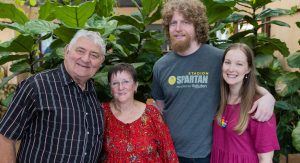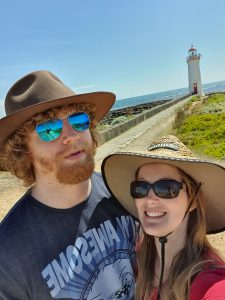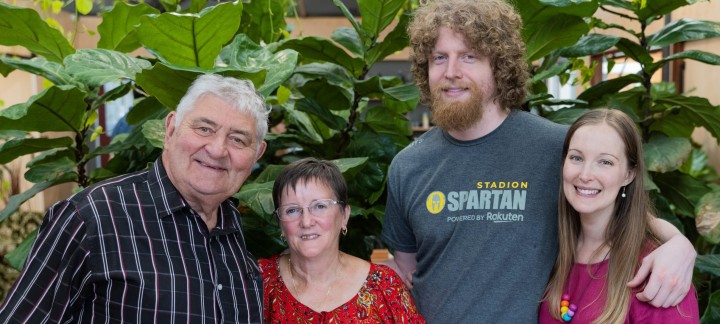Living with cerebral palsy has given Mercy Health Psychiatric Nurse Bethany Knight a unique understanding of the challenges people with disabilities face in healthcare, the workplace and wider community. She believes peer work is one of the most powerful tools in making people with disabilities feel included and understood.
Born three months premature, Bethany suffered a brain haemorrhage at just 17 days old, which resulted in cerebral palsy. “I was very fortunate to have two very supportive parents who were really good at making sure that I had all the therapy and support that I could possibly have so I could be as functional as I could be, which was really special,” says Bethany.

Bethany with her family and fiancé Steve.
“My cerebral palsy affects my balance and coordination. It also affects my spacial awareness, so I’m probably going to walk into the object that anyone else would walk around. Navigating stuff is a bit tricky but again it’s something that I am used to doing all the time. I can walk fine but I probably don’t have the greatest endurance. High-level activities are not something that I’m good at but I’m not too fussed at not being able to jump hurdles!” she says.
Bethany has worked as a psychiatric nurse at Mercy Health for 11 years. From her experience, she believes one of the most important and powerful tools in making people with disabilities feel truly supported, particularly in the healthcare setting, is peer work. A peer worker is someone who shares a similar experience and can provide meaningful social and emotional support and a way forward.
“I would love to see more peer work in the disability advocacy space because that is not something I have seen very much of,” Bethany says. “When I was going through the experience of having my medication pump installed for chronic hip and back pain associated with my cerebral palsy, it would have been great to have someone there who knew what I was going through.”
I would love to see more peer work in the disability advocacy space.
In the work setting, she also believes it is important for people with disabilities to be primarily valued for their skills and what they bring to the team. “It’s really good to want to support people with disabilities but no one wants to be known as the disabled colleague,” Bethany says. “Valuing people for the skills and gifts that they bring to the team is a really important part of creating a culture of inclusiveness.”

Bethany and Steve. The pair is getting married in January 2022.
Bethany has felt supported and encouraged at Mercy Health and is happy to see that the organisation is making some meaningful inroads for people with disabilities through its Accessibility Action Plan and Committee, of which she is part. The committee meets every three months to plan and implement actions that will make Mercy Health a more accessible and inclusive environment.
In particular, Bethany believes it is important to provide meaningful work for people with disability.
“If we are hiring people with a broad range of disabilities, we need to make sure that their work is meaningful. I would like to think that I was given a job because I was the best applicant, not because of my disability. People with disabilities want meaningful work.”
Last reviewed December 19, 2021.



